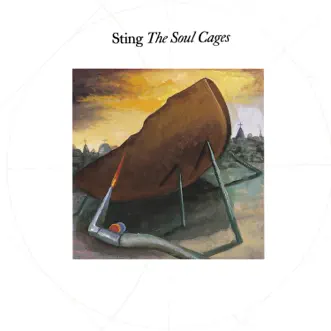About The Soul Cages by Sting Album
The Soul Cages is the third studio album released by Sting. Released in 1991, it became his second #1 album in the United Kingdom. While a relatively little-known album to casual fans, with a similar lack of popularity to 1996's Mercury Falling, this very personal and introspective album spawned four singles, "All This Time", "Why Should I Cry For You", "Mad About You", and "The Soul Cages". The latter won the 1992 Grammy Award for Best Rock Song. The Soul Cages is a concept album focused on the death of Sting's father. At the time, Sting had developed a writer's block shortly after his father's death; the episode lasted several years, until Sting was able to overcome his affliction by dealing with the death of his father through music. The first song written for The Soul Cages was "Why Should I Cry for You", and Sting has stated the rest of the album flowed quite easily after that first hurdle was overcome. Most of the songs have motifs related to sailing or the seas (Sting's father, according to Sting's autobiography, Broken Music, had always regretted not becoming a sailor.) There are also references to Newcastle, the part of England where Sting grew up. Album opener "Island of Souls" tells the story of Billy, the first son in a family line of riveters. As he watches the ships his father create set sail, Billy dreams of taking his father along with him to escape by sea; his dreams become more prevalent as his father is injured and given three weeks to live. "All This Time" chronicles Billy's desire to bury his father at sea. The middle section of the record focuses mainly on the town Billy lives in and its people, before the highly introspective "Why Should I Cry For You". Musically, a mournful horn note at the end of "Island of Souls" returns to open "The Wild Wild Sea", symbolizing the return of the main narrative: Billy, now grown, is at sea chasing a ship down, only to find his father being the captain of the boat he is pursuing. In a more fantastical narrative, Billy's father is being held captive by a demonic fisherman, with whom Billy wagers his life in a drinking game in a bid to set his father free. At the time this album appeared, the music industry was starting to shift away from using CD longboxes. Sting, a committed environmentalist, wanted to eliminate the amount of cardboard waste caused by the longbox. The original packaging was a fourfold cardboard case that could be modified to look like a longbox, and folded back into a jewel box sized CD package for home storage. In Germany, the CD was only sold in jewel cases, and long boxes were totally uncommon there. The cover painting was a commissioned work by the Scottish artist Steven Campbell. To date, this is the only studio album by Sting not to feature a photograph of himself on the cover.



